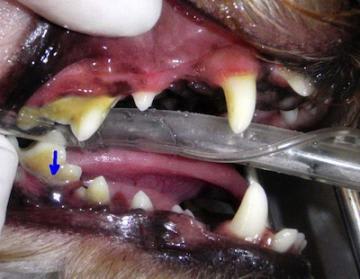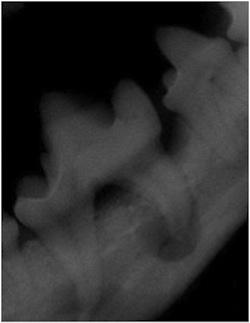
Find out how to tell if your dog or cat needs a dental cleaning.
Dental Case of the Month: Daisy
There is no doubt about it, Daisy is CUTE!
She has a wonderful personality and is curious, active and loving. Daisy’s mom takes excellent care of her and provides great food, veterinary care on schedule, fresh water, exercise and lots of love.
When Daisy was 14 months of age, Dr. Golden, Daisy’s primary veterinarian, recommended a dental evaluation and cleaning because of tartar and gum inflammation.
At Animal Hospital of North Asheville, each time your pet’s teeth are professionally cleaned a comprehensive evaluation is included to be sure that all dental problems are identified.
Once Daisy was under anesthesia with a breathing tube in place, this picture was taken. It shows that there was tartar on most of her teeth and that her gums were slightly swollen. Periodontal disease is there but it cannot be seen in this picture because it is below the gum line.

This is one of Daisy’s dental x-rays, and it shows two problems:

- The darkness at the root tips is bone loss from periodontal infection (periapical abscesses).
- The dark areas under the center and right top of the tooth (the crown) indicate horizontal bone loss caused by infection from the bacteria in the tartar. This process weakens the jawbone over time.
Daisy’s tooth had to be extracted. Extraction of the tooth will stop the bone loss and the infection.
Does My Dog Need A Dental Cleaning?
DAISY SHOWED NO SIGN OF PAIN. Daisy’s infection was so bad that bone was being destroyed by infection and yet Daisy did not have symptoms. I have heard clients say, “I am very close to my pet; I assure you that I would know if something was wrong.”
Unfortunately, this is not true of pets with oral pain. Pets have evolved to hide oral discomfort and they are good at it. The x-ray indicates that Daisy’s tooth was infected for about 12 months. It is important not to rely on your pet to alert you of a dental problem.
By the time a pet stops eating or shows some outward sign of a dental problem, it has usually become severe
DAISY IS LESS THAN TWO YEARS OLD. Many pets have dental disease early in life. Seventy-five percent of pets have periodontal disease by age three. Many have it by age one. Periodontal disease occurs in pets of all ages. Periodontal disease occurs five times as often in pets as it does in people.
TARTAR IS NEVER OK: Daisy had tartar on her teeth. Even small amounts of tartar should ideally be addressed with a professional cleaning. Unfortunately, many people think it is OK for dogs to have tartar on their teeth, but all human dentists tell their patients to have their teeth cleaned before they have tartar because that prevents gun disease.
BAD BREATH: There can be various causes of bad breath in pets but the most common is periodontal disease. You should always be concerned if your pet has bad breath (also called halitosis), and the cause should be identified. Daisy had bad breath but not terrible breath.
WAITING: If you think something might be wrong with your pet’s mouth or teeth, it is best not to delay getting it cared for because it will only get worse. Daisy’s family is to be commended because they acted quickly once they realized there was a problem.
We are happy to report that dear little Daisy is totally recovered from her dental problems. Even with the best of home care (tooth brushing by her mom), Daisy, like many dogs, will likely need to have her teeth cleaned professionally once or twice a year to prevent periodontal disease.
The American Veterinary Dental Society suggests that most pets benefit from a dental cleaning and evaluation yearly starting at age one. Our veterinarians evaluate the teeth at every Annual Examination and make a written recommendation.
DENTAL GOAL: Every pet deserves to have a comfortable mouth that is not infected.
